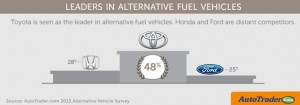 Sales of plug-ins, hybrids, natural gas vehicles, and other alternative fuel vehicles (AFVs) are comparatively small when looking at overall new vehicle sales in the US. Still, they’re grabbing a lot of attention from media and marketing analysts lately, especially if you add in diesel-engine vehicles. While some will scoff at the idea of “clean diesel,” these cars are growing significantly in US sales numbers; diesel is about 55 cents more expensive than gasoline at retail stations, but the cars (especially from German automakers) are getting great mileage and performance. Here’s the latest coverage on how car buyers are perceiving AFVs……
Sales of plug-ins, hybrids, natural gas vehicles, and other alternative fuel vehicles (AFVs) are comparatively small when looking at overall new vehicle sales in the US. Still, they’re grabbing a lot of attention from media and marketing analysts lately, especially if you add in diesel-engine vehicles. While some will scoff at the idea of “clean diesel,” these cars are growing significantly in US sales numbers; diesel is about 55 cents more expensive than gasoline at retail stations, but the cars (especially from German automakers) are getting great mileage and performance. Here’s the latest coverage on how car buyers are perceiving AFVs……
Follow the money: A recent survey by AutoTrader.com says that the top reasons shoppers would consider purchasing an AFV are less emotional and more practical, with three of the top five being related to saving money. “Better fuel economy” came in first at 70%, followed by “Cost of savings on gas” at 56%, “Cleaner emissions” at 37%, “Better for the environment” at 28% and “Federal Tax Credit” at 24%. The survey measured consumer attitudes on a range of fuels and technologies including diesels, hybrids, electric vehicles and plug-in hybrids. The study also found that perceptions about battery life/range are working against hybrid and plug-in vehicles. Diesel is facing concerns about the fuel expense, the cost of the vehicles, and potentially high cost of maintenance.
Luxury buyers: Phoenix International’s recent finding on AFVs found that luxury SUV consumers and non-luxury car consumers have the most interest; hybrid and electric vehicles are in the non-luxury car category, so that wasn’t a surprise in the survey findings. What about luxury SUVs? Diesel SUVs have been growing in popularity, which seems to have opened the door for car shoppers to consider alternatives, along with the perception that AFVs partially embody the latest in automotive technology. Phoenix International finds it very interesting that Tesla Motors is going after all of the luxury market by adding its upcoming Model X – an electric SUV – to its model lineup next year.
As for branding: In the AutoTrader study, for all the automakers who offer AFVs, seven had high awareness among survey respondents: Toyota, Honda, Ford, Lexus, Chevrolet, Nissan, and Volkswagen. When asked which automakers they would identify as leading in the space, Toyota came out on top with 48%, Honda came in second with 28%, and Ford made third place with 25%.
As for sub-brands: Green Car Reports made a very convincing point that the way automakers are marketing green sub-brands aren’t clicking very well for name retention. The article gives readers a test – to read a list of sub-brands for automaker green technology offerings, then scan a list of automaker brand names, and then accurately connect the dots. Here’s the correct answers: BlueEfficiency – Mercedes-Benz; BlueMotion – Volkswagen; Drive-E – Volvo; EarthDreams – Honda; EcoBoost – Ford; EcoTec – GM; EfficientDynamics – BMW; Hybrid Synergy Drive – Toyota; PureDrive – Nissan; and SkyActiv – Mazda. Ford’s EcoBoost has stuck with many minds along with Mazda’s SkyActiv; Honda’s EarthDreams and Toyota’s Hybrid Synergy Drive stand out a little bit. The other ones seem pretty forgetful (at least for this writer).



